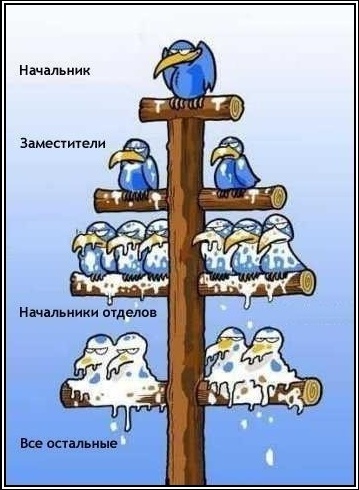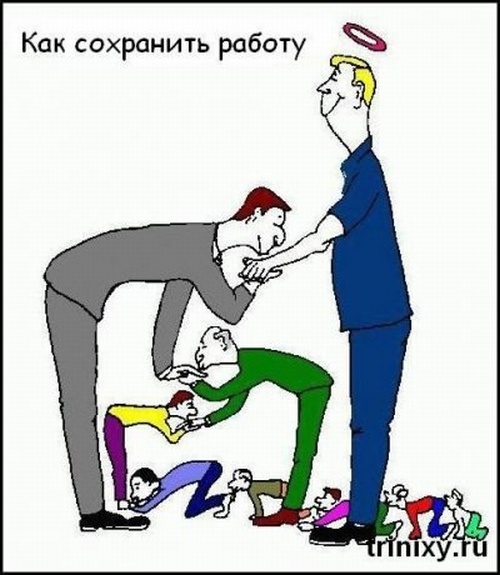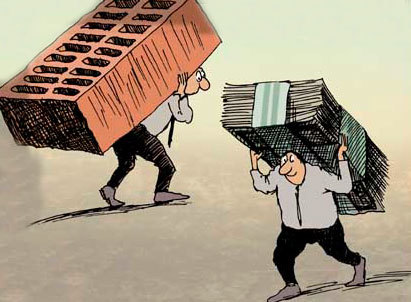Properties of the vertical of corporate power
In Yandex, the founding fathers are ideal for IT ... and what kind of positive book about them and about the ideology of Yandex did Sokolov-Mitrich write ... But what happened at Yandex in several years "below"? In this post, the last link shows - complete darkness .
The second example - Magnit is ruled by such a clever and correct Sergei Galitsky (read his interview), but some hell is going on “downstairs”: “We are not slaves,” his employees shout .
Why is that? What kind of evil rock is pursuing big companies?
Let us, to simplify, abstract from the fact that climb is not the best, and consider the vertical of power in the Company from normal people.
')
Even in this ideal case, it has, and moreover with time, the following negative properties:
1. Strengthening rigor when moving orders from top to bottom.
2. Positive feedback and distortion of reporting when moving information from the bottom up.
3. Reduction of mutual understanding with an increase in the number of intermediate links between employees.
Next, we consider them in more detail and formulate:
4. Advice to employees going to work in large companies.
5. His own humble opinion as to why Yandex is still good compared to many others.

Movement from top to bottom orders and everything else. You did not expect to see another picture here?
1.1. Each manager, broadcasting the task of his superior to his subordinates, quite naturally wants to lay a temporary reserve for safety.
Therefore, the more intermediate chiefs, the time frames for performers become.
1.2. If there is a request for information from above, then each intermediate level asks a little more than what needs to be communicated further upwards - in order to “own the full situation”, to believe in the completeness and correctness of the response provided from their subordinates. As a result, the amount of work “per waste bin” grows as a geometric progression from the number of intermediate chiefs.
1.3. The fact that “at the top” was meant as a recommendation, suitable only “in most cases”, “at the bottom” becomes rigidly mandatory without options.
Thus, when passing from top to bottom, the vertical works as a kind of “evil booster”: all requirements are tightened, the amount of extra work increases, the wall of bureaucracy grows.
2.1. Nobody wants to create a negative impression on their boss, therefore any intermediate commanding link embellishes the existing situation. No, it does not lie, but it smoothes the corners - it is silent about unnecessary details of the processes and results. Do not think that only for yourself, of course, and for the sake of your subordinates: you will please the boss, form a positive impression on him, and he will give you and your subordinates more benefits, more posts, expand the area of responsibility and the zone of influence.
2.2. The higher the boss, the more salary and bonuses his subordinates receive. Moreover, they are inclined to agree with him - they will go after him at all for the sake of preserving their status, all the same, all the changes will fall on the lower level, and not on them.
Intermediate links of chiefs for the same reason will agree with the change (although the lower they are, the more they will have internal rejection), and they will work their part of the plan, i.e. take on some of the responsibility.
Therefore, reports on the results of the changes will try hard to give positive results.
This is especially aggravated by the change of the general director - if the old ones are very willing to stay in the new team, then they will fulfill any whim. At the expense of his subordinates, of course.
2.3. The higher up the vertical, the more pumped up by the chief with the approval coming from below for his decisions. As a result, he eventually begins to feel himself a holy benefactor (the one that is more modest - half-holy).

Holy benefactor, halo available.
2.4. The messenger who brought bad news is chopped off his head.
But this is in the IG, and in our humane country they don’t raise their posts, they don’t raise their salaries, they are dismissed.
Just imagine the situation - everyone loves and respects the boss (see p. 2.3.), All of his decisions have already been given positive feedback by smart people in high positions, and according to reports everything is fine. And here comes the engineer, and says - you made stupid decisions, and the fox comes to you. Here's what to say so impudent? The chief will answer: you are a fool, you do not see the whole battlefield from your basement, as I am from my mountain. Yes, you're also snapper, inadequate.
I’m half-holy, I give you a job, but you don’t like it - the company’s doors are always open to the exit, we don’t need such brawlers, we have a friendly team, etc. etc.

Oh scary
Consequence: The hierarchy is not made up of children, so everyone at their level laughs at the nonsense of high authorities (option: cursing), but there is no one to shout "the king is naked."
Comment. The tale of the naked kings of Yandex - not the worst option. Here, for example, Dr. Mengele thought to himself that he was engaged in science. It is a pity that later he did not want to take the opportunity to defend his views on the Hague court - he hid and was not found. But about these figures later, we now have an abstract ideal case - the vertical of power from normal people.
3.1. Those who pay the mortgage and take to s / n, and those who think "how to get the second billion, to protect themselves from losing the first" - different life problems, different tasks, opinions and principles.

They have different problems and tasks.
3.2. Different levels of hierarchy have different plans for the future of the Company - someone is already preparing the withdrawal of assets, bankruptcy and resale, and someone has been dreaming to work there further, naively thinks that the larger the office, the more stable the work in it.
3.3. At the top, the organization seems flexible and adaptive, and at the bottom bureaucratic to insanity.
Both views are partially correct - at the top, the “strategists” flexibly change everything, not delving into the “little things”, stepping over the layers of their own regulations and orders - they are the owners of their own regulations, and they know how to interpret them correctly. In addition, many of the restrictions at the top are advisory in nature (for most cases - remember?). At the bottom, these little things are wedging each other all the movement, because already binding. Strict adherence to all regulations is known to science as the " Italian strike " - stopping work for formal reasons. In order for the Company to continue to work, “downstairs” it is often necessary not to follow the regulations, but to get out, to ask to turn on the head and find common sense in it.
3.4. Immediate superiors in a conversation with subordinates ascribe the authorship of all the negative changes to their superiors. They keep silent about their contribution. On the contrary, they took all measures to soften the blow to their team.
3.5. Ignorance of the decision-making context of the true tasks assigned to top management, “strengthening evil” when going down vertically, make the decisions of the boss seem all the less adequate, the higher this boss is from you in the hierarchy.
4.1. Better get a job in the head offices - less levels of hierarchy from the most important superior to you, more positive around, less bureaucracy. The cuts in both posts and social packages will last you. And yes, the horrors of such a centralization now popular (more precisely, “Moskvization”) will pass you by.
4.2. If there are no options and go to work in the branch, then at least make sure that the Company's top operational management is able to work adequately with the branch structure, and is not going to centralize it.
Ask what consulting firms are now serving the company, what these consultants have previously done in other companies.
What did the director in the last work. Maybe he is a universal “effective” manager who previously worked at a garbage collection company, and now he manages IT? (This is not a joke, it is a harsh truth).
Find out what processes of transformation of the power vertical go now in the office / were recently / are planned further.
4.3. Bear in mind that IT is an unstable area where you need to quickly run forward to stay in place. Therefore, IT in a company can either develop or degrade.
During the changes and experimentation started by top management, IT is likely to be “optimized”, i.e. in fact, shrink and degrade.
If you see complete hell, chaos, idiocy and idiocy around, then you are an engineer.
But I tried to explain to you that the idiocy around you does not always hide behind itself something bad, such as “draining” the company, making it cheaper to sell, withdrawing assets before bankruptcy.
Often, the actions of a certain number of top managers who contradict the interests of the main team are explained either by good intentions (earn more, including your salary), or even by personal goals, but without the intention to drink all the blood of the company (only a bit ).
All our people are good, and they want good, except that the vertical has worked for you as an amplifier of evil, and they gave positive feedback ... and a bonus.
And so it will be until the arrival of the complete fox, which they can no longer ignore.
And then they will fly away on their golden parachutes , and you will stay in ...
Hmm, stop, I'm writing a positive post.
Returning to Yandex.
Employees Yandex - rejoice, your leaders noticed that the fox came.
Rejoice, your leaders are so good that they are able to admit their mistakes and give the command to “return everything backwards”. Alas, not everyone hassuch steel such determination.
You have hope that they are smart enough to compensate for the shortcomings of their company - to patch not only the software, but also to put props under the vertical of power.
Believe me, not everyone is so lucky with the leaders.
And what is your fox? Do not exaggerate, this is the maximum underperformance .
1. How new managers destroy the companies entrusted to them.
2. Our benefactors. Councils of Western consulting companies.
3. What should the new director do to correct the consequences of the reign of the previous pseudo-efficient manager and his team?
The second example - Magnit is ruled by such a clever and correct Sergei Galitsky (read his interview), but some hell is going on “downstairs”: “We are not slaves,” his employees shout .
Why is that? What kind of evil rock is pursuing big companies?
Let us, to simplify, abstract from the fact that climb is not the best, and consider the vertical of power in the Company from normal people.
')
Even in this ideal case, it has, and moreover with time, the following negative properties:
1. Strengthening rigor when moving orders from top to bottom.
2. Positive feedback and distortion of reporting when moving information from the bottom up.
3. Reduction of mutual understanding with an increase in the number of intermediate links between employees.
Next, we consider them in more detail and formulate:
4. Advice to employees going to work in large companies.
5. His own humble opinion as to why Yandex is still good compared to many others.

Movement from top to bottom orders and everything else. You did not expect to see another picture here?
1. Strengthening rigor when moving tasks / orders / requests from top to bottom
1.1. Each manager, broadcasting the task of his superior to his subordinates, quite naturally wants to lay a temporary reserve for safety.
Therefore, the more intermediate chiefs, the time frames for performers become.
1.2. If there is a request for information from above, then each intermediate level asks a little more than what needs to be communicated further upwards - in order to “own the full situation”, to believe in the completeness and correctness of the response provided from their subordinates. As a result, the amount of work “per waste bin” grows as a geometric progression from the number of intermediate chiefs.
1.3. The fact that “at the top” was meant as a recommendation, suitable only “in most cases”, “at the bottom” becomes rigidly mandatory without options.
Thus, when passing from top to bottom, the vertical works as a kind of “evil booster”: all requirements are tightened, the amount of extra work increases, the wall of bureaucracy grows.
2. Positive feedback to the boss
2.1. Nobody wants to create a negative impression on their boss, therefore any intermediate commanding link embellishes the existing situation. No, it does not lie, but it smoothes the corners - it is silent about unnecessary details of the processes and results. Do not think that only for yourself, of course, and for the sake of your subordinates: you will please the boss, form a positive impression on him, and he will give you and your subordinates more benefits, more posts, expand the area of responsibility and the zone of influence.
Consequence: And the “manual” reporting, and even received through the “objective” ACS, can be significantly shifted from the true position in a positive direction.
2.2. The higher the boss, the more salary and bonuses his subordinates receive. Moreover, they are inclined to agree with him - they will go after him at all for the sake of preserving their status, all the same, all the changes will fall on the lower level, and not on them.
Intermediate links of chiefs for the same reason will agree with the change (although the lower they are, the more they will have internal rejection), and they will work their part of the plan, i.e. take on some of the responsibility.
Therefore, reports on the results of the changes will try hard to give positive results.
This is especially aggravated by the change of the general director - if the old ones are very willing to stay in the new team, then they will fulfill any whim. At the expense of his subordinates, of course.
2.3. The higher up the vertical, the more pumped up by the chief with the approval coming from below for his decisions. As a result, he eventually begins to feel himself a holy benefactor (the one that is more modest - half-holy).

Holy benefactor, halo available.
2.4. The messenger who brought bad news is chopped off his head.
But this is in the IG, and in our humane country they don’t raise their posts, they don’t raise their salaries, they are dismissed.
Just imagine the situation - everyone loves and respects the boss (see p. 2.3.), All of his decisions have already been given positive feedback by smart people in high positions, and according to reports everything is fine. And here comes the engineer, and says - you made stupid decisions, and the fox comes to you. Here's what to say so impudent? The chief will answer: you are a fool, you do not see the whole battlefield from your basement, as I am from my mountain. Yes, you're also snapper, inadequate.
I’m half-holy, I give you a job, but you don’t like it - the company’s doors are always open to the exit, we don’t need such brawlers, we have a friendly team, etc. etc.

Oh scary
Consequence: The hierarchy is not made up of children, so everyone at their level laughs at the nonsense of high authorities (option: cursing), but there is no one to shout "the king is naked."
Example of Yandex. I can assume that, some time ago, Yandex in the field of quality control made a "change". Maybe not at once, maybe it was a long process of degradation - it does not matter. It is important that the users-customers know that everything is bad, before the top management. And no one stopped these changes from the inside in time - those who could stop occupy too low positions (Section 2.4).
And if the voice from the lower floors to the top and reaches, then along the way the vocabulary is so softened that the original message can no longer be disassembled. (paragraph 2.1)
Comment. The tale of the naked kings of Yandex - not the worst option. Here, for example, Dr. Mengele thought to himself that he was engaged in science. It is a pity that later he did not want to take the opportunity to defend his views on the Hague court - he hid and was not found. But about these figures later, we now have an abstract ideal case - the vertical of power from normal people.
3. Reduction of mutual understanding with an increase in the number of intermediate links between employees
3.1. Those who pay the mortgage and take to s / n, and those who think "how to get the second billion, to protect themselves from losing the first" - different life problems, different tasks, opinions and principles.

They have different problems and tasks.
3.2. Different levels of hierarchy have different plans for the future of the Company - someone is already preparing the withdrawal of assets, bankruptcy and resale, and someone has been dreaming to work there further, naively thinks that the larger the office, the more stable the work in it.
3.3. At the top, the organization seems flexible and adaptive, and at the bottom bureaucratic to insanity.
Both views are partially correct - at the top, the “strategists” flexibly change everything, not delving into the “little things”, stepping over the layers of their own regulations and orders - they are the owners of their own regulations, and they know how to interpret them correctly. In addition, many of the restrictions at the top are advisory in nature (for most cases - remember?). At the bottom, these little things are wedging each other all the movement, because already binding. Strict adherence to all regulations is known to science as the " Italian strike " - stopping work for formal reasons. In order for the Company to continue to work, “downstairs” it is often necessary not to follow the regulations, but to get out, to ask to turn on the head and find common sense in it.
I observe with interest now the attempt of one company to record all its business processes in the form of regulations. Probably, top management thinks that this way they will get rid of dependence on specific people. With the regulations, they say, and the monkeys will cope, they will be recruited and recruited. Oh, you are my little ones ... Starting from a certain level, the more regulations, the more inhibited the processes are, and the regulations tend to become obsolete. In addition, they are still waiting for the discovery of the existence, let's say, of the configuration space in IT systems, and that shoving it entirely into UCMDB / NRI / etc. and no one else in the world has been able to maintain relevance.
Fix: At different levels of the hierarchy - different ideas about their own organization.
3.4. Immediate superiors in a conversation with subordinates ascribe the authorship of all the negative changes to their superiors. They keep silent about their contribution. On the contrary, they took all measures to soften the blow to their team.
Corollary: In the eyes of subordinates of the lower level, top managers are somewhere on the right hand of Satan.
Here, for example, it is in the eyes of techies - a feast during the plague: Pier-1, (sorry, lost the link where the comments were from techies) Pier-2
3.5. Ignorance of the decision-making context of the true tasks assigned to top management, “strengthening evil” when going down vertically, make the decisions of the boss seem all the less adequate, the higher this boss is from you in the hierarchy.
4. Employee tips
4.1. Better get a job in the head offices - less levels of hierarchy from the most important superior to you, more positive around, less bureaucracy. The cuts in both posts and social packages will last you. And yes, the horrors of such a centralization now popular (more precisely, “Moskvization”) will pass you by.
4.2. If there are no options and go to work in the branch, then at least make sure that the Company's top operational management is able to work adequately with the branch structure, and is not going to centralize it.
Ask what consulting firms are now serving the company, what these consultants have previously done in other companies.
What did the director in the last work. Maybe he is a universal “effective” manager who previously worked at a garbage collection company, and now he manages IT? (This is not a joke, it is a harsh truth).
Find out what processes of transformation of the power vertical go now in the office / were recently / are planned further.
4.3. Bear in mind that IT is an unstable area where you need to quickly run forward to stay in place. Therefore, IT in a company can either develop or degrade.
During the changes and experimentation started by top management, IT is likely to be “optimized”, i.e. in fact, shrink and degrade.
5. Why is Yandex still good?
If you see complete hell, chaos, idiocy and idiocy around, then you are an engineer.
But I tried to explain to you that the idiocy around you does not always hide behind itself something bad, such as “draining” the company, making it cheaper to sell, withdrawing assets before bankruptcy.
Often, the actions of a certain number of top managers who contradict the interests of the main team are explained either by good intentions (earn more, including your salary), or even by personal goals, but without the intention to drink all the blood of the company (only a bit ).
All our people are good, and they want good, except that the vertical has worked for you as an amplifier of evil, and they gave positive feedback ... and a bonus.
And so it will be until the arrival of the complete fox, which they can no longer ignore.
And then they will fly away on their golden parachutes , and you will stay in ...
Hmm, stop, I'm writing a positive post.
Returning to Yandex.
Employees Yandex - rejoice, your leaders noticed that the fox came.
Rejoice, your leaders are so good that they are able to admit their mistakes and give the command to “return everything backwards”. Alas, not everyone has
You have hope that they are smart enough to compensate for the shortcomings of their company - to patch not only the software, but also to put props under the vertical of power.
Believe me, not everyone is so lucky with the leaders.
And what is your fox? Do not exaggerate, this is the maximum underperformance .
Further in the program:
1. How new managers destroy the companies entrusted to them.
2. Our benefactors. Councils of Western consulting companies.
3. What should the new director do to correct the consequences of the reign of the previous pseudo-efficient manager and his team?
Source: https://habr.com/ru/post/295314/
All Articles